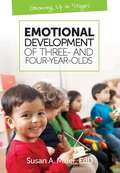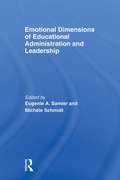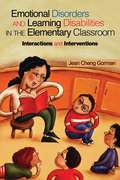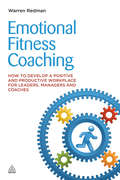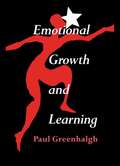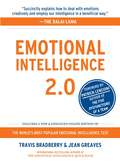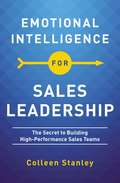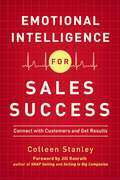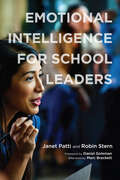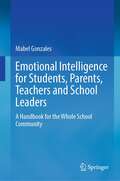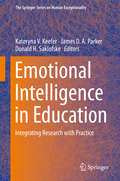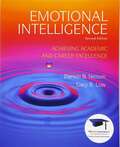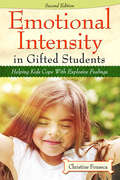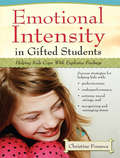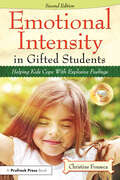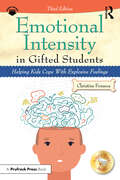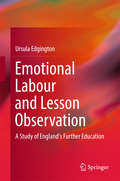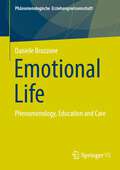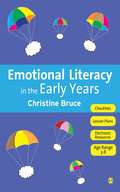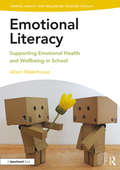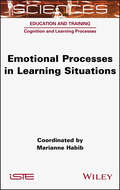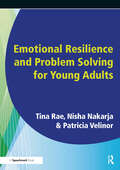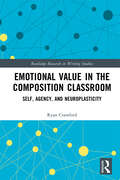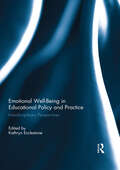- Table View
- List View
Emotional Development of Three- and Four-Year-Olds
by Susan A. MillerWhether you see a preschooler laughing or crying, hugging or tugging on a playmate, taking risks or seeking comfort from an adult, you know that they are developing their emotional skills and growing up in so many ways every day. And they need your help! Emotional Development of Three- and Four-Year-Olds shares common milestones and typical scenarios to help you recognize various ways that preschoolers express their feelings and interact with others. You will also learn strategies for supporting and nurturing their growth, especially in situations involving the following types of emotional challenges and accomplishments: Expressing kindness and empathy Exerting independence Managing shyness Building confidence Testing limits and taking risks Expressing anger and frustration Dealing with fears and anxieties Sharing a sense of humor Handling conflicts Dealing with separation and loss As you support preschoolers struggling to handle emotional challenges that occur during everyday interactions with adults and other children, you will help them learn the skills to navigate their emotional ups and downs in more positive ways. Part of the Gryphon House Growing Up in Stages series.
Emotional Dimensions of Educational Administration and Leadership
by Eugenie A. Samier Michèle SchmidtEmotional Dimensions of Educational Administration and Leadership explores foundational theories for emotional dimensions of educational administration and leadership as they influence our understanding, analysis and practice in the field. It covers a broad range of topics, such as ethics, authority, personality, social justice, gender discrimination, organisational culture, decision-making, accountability and marketisation. The first section, ‘Theoretical Foundations’, includes discussion of the early modern romantic philosophy that produced the heroic notion of leadership, the idealist philosophy of Hegel, existential concerns through Kierkegaard, the contributions of psychoanalysis, and Habermasian critical theory. The second section, ‘Types of Emotional Analysis’, includes examinations of the material culture, emotional economies, the politics of emotion, and the relationship between emotion and rationality. The last section, 'Critical and Contemporary Issues', includes critiques of the fear arising from accountability regimes, the political economy of the market model, a feminist critique of ideologies reflecting emotional investments, narrative expressions for the emotional context of teamwork, the problem of narcissism, and the emotional dimensions of role engagement. This volume explores an area that is only just re-emergent in the last few years. The collection demonstrates the relevance to practical issues and problems internationally, both within the organisational context and extra-organisationally with a focus on the application of emotional factors as they affect our understanding of, and practice in, educational organisations. The emotions of education affect the implementation of political values and culture within organisations.
Emotional Disorders and Learning Disabilities in the Classroom: Interactions and Interventions
by Jean Cheng GormanThis unique book focuses on the interaction of learning disabilities and emotional disorders, fostering an understanding of how learning problems affect emotional well-being, and vice-versa. Jean Cheng Gorman provides research-based, classroom-tested practical interventions teachers can integrate into their daily routines, to help students become more purposeful and more effective. This book serves as a resource and a practical classroom guide for all elementary school teachers who are presented with the challenges of addressing the multiple needs - academic, emotional and social - of children with learning disabilities and emotional problems. Part I presents an overview of common learning disabilities and emotional problems. What disorders are teachers most likely to encounter? When should educators intervene, and when should they seek help from others? Part II offers specific classroom interactions and interventions, including insights on how: - Learning disorders are associated with emotional problems - Emotional problems can hide learning disabilities - Learning disorders can exacerbate emotional conditions - Emotional problems can intensify learning disabilities - Emotional health enhances learning . . . and each chapters includes tangible steps teachers can take in their classroom, as well as reproducibles that can be used as is, or as a starting point for materials development. The book ends with a rich and up-to-date list of additional resources for teachers and an annotated bibliography of children’s books and materials. Elementary teachers, administrators, and professional development directors can use this unique and comprehensive book as a solid foundation of knowledge and a practical resource for intervention.
Emotional Fitness Coaching: How to Develop a Positive and Productive Workplace for Leaders, Managers and Coaches
by Warren RedmanEmotional Fitness Coaching is the practical approach to applying the principles of emotional intelligence to the workplace to create a healthy, positive and creative environment in every situation. Based on thirty years experience in the field, it offers a toolkit for people to be better managers, leaders and professionals while also feeling more at ease with the interpersonal skills vital to any business relationships. Using a storytelling approach it covers a range of techniques including Power Listening, Learning from Experience, the power of Group Dialogue, Creating Balance and Emotional Fitness Storytelling. Each tool is described and examples given of how each could be used in various work circumstances. Exercises throughout the text provide the opportunity for the reader to apply the tools directly to their own context.
Emotional Growth and Learning
by Paul GreenhalghWhen working with children, an understanding of the social interactions and relationships which influence emotional growth and learning is essential. Emotional Growth and Learning clarifies these processes and serves as a practical and theoretical resource for the training of teachers and other professionals. Paul Greenalgh draws on case studies from his own experience to illustrate the relevant concepts of Jungian, psychoanalytic and humanistic psychology . Individual and group exercises help adults to explore their own participation in the growth and learning processes and the book's multi-disciplinary approach and accessible style will appeal to teachers, parents and those working in clinical psychology, counselling and social work.
Emotional Intelligence 2.0
by Patrick M. Lencioni Travis Bradberry Jean GreavesFOREWORD BY PATRICK LENCIONI, BESTSELLING AUTHOR OF THE FIVE DYSFUNCTIONS OF A TEAM.Emotional Intelligence 2.0 is a book with a single purpose-increasing your EQ. Here's what people are saying about it:"Emotional Intelligence 2.0 succinctly explains how to deal with emotions creatively and employ our intelligence in a beneficial way."-THE DALAI LAMA"A fast read with compelling anecdotes and good context in which to understand and improve."-NEWSWEEK"Gives abundant, practical findings and insights with emphasis on how to develop EQ."-STEPHEN R. COVEY"This book can drastically change the way you think about success...read it twice."-PATRICK LENCIONIIn today's fast-paced world of competitive workplaces and turbulent economic conditions, each of us is searching for effective tools that can help us to manage, adapt, and strike out ahead of the pack.By now, emotional intelligence (EQ) needs little introduction-it's no secret that EQ is critical to your success. But knowing what EQ is and knowing how to use it to improve your life are two very different things.Emotional Intelligence 2.0 delivers a step-by-step program for increasing your EQ via four, core EQ skills that enable you to achieve your fullest potential:1) Self-Awareness2) Self-Management3) Social Awareness4) Relationship Management
Emotional Intelligence for Sales Leadership: The Secret to Building High-Performance Sales Teams
by Colleen StanleyThe best way to get ahead in sales is by developing the critical soft skills that will enable you not just survive but thrive.Chronic complainers, no accountability finger-pointers, or learning-resistant laggards—these culture-killers costs sales organizations more in productivity than being weak in the so-called hard skills of selling. Sales leadership expert Colleen Stanley shows how emotional intelligence and the development of these critical soft skills improve sales leadership effectiveness and outperforms doubling down on more sales technology tools and fads.In Emotional Intelligence for Sales Leadership, Colleen provides sales secrets that:Shows sales leaders why &‘real world&’ empathy and emotion management are the key to building strong relationships with their sales team.Offers simple steps on how sales leaders create sales cultures that embrace feedback and change through the development of critical emotional intelligence skills.Provides guidance on how to identify key emotional intelligence skills needed in your hiring process to build resilient sales teams.Walks readers through the process of training sales teams on soft skills that ensure the consistent execution of the right selling behaviors.The missing link is in hiring for and developing emotional intelligence skills in sellers and sales leaders. Emotional Intelligence for Sales Leadership will connect with anyone charged with growing sales in business-to-business or business-to-consumer sales.
Emotional Intelligence for Sales Success: Connect with Customers and Get Results
by Colleen StanleyEven skilled salespeople buckle in tough selling situations—getting defensive with prospects who challenge them on price or too quickly caving to discount pressure. These fight-or-flight responses are something salespeople learn to avoid when building their emotional intelligence.Sales trainer and expert Colleen Stanley cites studies that show how emotional intelligence (EI) is a strong indicator of sales success--and offers tips on how you can sharpen your skills and expand your emotional toolkit. Increasing your emotional intelligence is a sure way to overcome tough selling encounters.In Emotional Intelligence for Sales Success, you&’ll learn:how to increase impulse control for better questioning and listening,which EI skills are related to likability and trust,how empathy leads to bigger sales conversations and more effective solutions,how emotional intelligence can improve prospecting effortswhich EI skills are most common among top sales producers, and much more.Customers can get product information and price comparisons online. The true differentiator between you and a bot is your ability to deftly solve problems and build relationships.Emotional intelligence plays a vital role at every stage of the sales process. From business development to closing the deal, emotional intelligence will drive your performance--and your success.
Emotional Intelligence for School Leaders
by Robin Stern Janet PattiA handbook that helps educational leaders hone the social and emotional skills essential to promoting positive school culture and navigating their complex jobs. In this profoundly useful work, Janet Patti and Robin Stern make the case for social-emotional learning (SEL) as part of a critical skill set for K–12 school leaders, and they offer coaching on how to integrate emotional intelligence into leadership practices. Patti and Stern draw on recent research from psychology and education, as well as their combined 40 years of experience in the fields of SEL and leadership training, to highlight the many benefits of SEL-focused professional development for superintendents, principals, and aspiring school leaders. They also give readers the tools to develop their own SEL skills. Emotional Intelligence for School Leaders outlines key SEL skills, from mindfulness and self-management to relationship building and conflict resolution, and details how each can be applied in a leadership context. Case studies of a variety of successful educational leaders who employ positive psychology in their work illustrate the strategies they used to cultivate and apply their own SEL skills. This encouraging book underscores how teams that lead with self-awareness and empathy can promote well-being, foster resilience, and prevent burnout among educators and ultimately increase equity in the education system.
Emotional Intelligence for Students, Parents, Teachers and School Leaders: A Handbook for the Whole School Community
by Mabel GonzalesThis book heightens readers’ awareness of the importance of emotional intelligence and how it impacts our lives. It inspires parents, teachers and school leaders to learn more about emotional intelligence as a process of self-improvement, relational skills, and to help our students to develop emotional intelligence from an early stage of their lives. There are four parts in the book. Part 1 explains the importance of emotional intelligence in every aspect of our lives. It presents models and theories of emotional intelligence and explains how our emotions control our mind, body and spirit. Part 2 gives insights into how emotions play a significant role in our relationships with others. Part 3 takes the reader from family to the workplace and highlights the importance of becoming more aware of our emotions at work and how we relate to others. Part 4 emphasises the importance of helping our students to develop essential emotional intelligence to face this increasingly complex and challenging world.
Emotional Intelligence in Education: Integrating Research with Practice (The Springer Series on Human Exceptionality)
by James D. Parker Donald H. Saklofske Kateryna V. KeeferThis book highlights current knowledge, best practices, new opportunities, and difficult challenges associated with promoting emotional intelligence (EI) and social-emotional learning (SEL) in educational settings. The volume provides analyses of contemporary EI theories and measurement tools, common principles and barriers in effective EI and SEL programming, typical and atypical developmental considerations, and higher-level institutional and policy implications. It also addresses common critiques of the relevance of EI and discusses the need for greater awareness of sociocultural contexts in assessing and nurturing EI skills. Chapters provide examples of effective EI and SEL programs in pre-school, secondary school, and university contexts, and explore innovative applications of EI such as bullying prevention and athletic training. In addition, chapters explore the implications of EI in postsecondary, professional, and occupational settings, with topics ranging from college success and youth career readiness to EI training for future educators and organizational leaders. Topics featured in this book include: Ability and trait EI and their role in coping with stress, academic attainment, sports performance, and career readiness.Implications of preschoolers’ emotional competence for future success in the classroom.Understanding EI in individuals with exceptionalities.Applications of school-based EI and SEL programs in North America and Europe.Policy recommendations for social-emotional development in schools, colleges and universities.Developing emotional, social, and cognitive competencies in managers during an MBA program.Emotional intelligence training for teachers.Cross-cultural perspective on EI and emotions. Emotional Intelligence in Education is a must-have resource for researchers, professionals, and policymakers as well as graduate students across such disciplines as child and school psychology, social work, and education policy.
Emotional Intelligence: Achieving Academic And Career Excellence In College And In Life
by Darwin B. Nelson Gary R. LowKEY BENEFITS: The new second edition of this book provides new students with 13 emotional intelligence skill lessons that will help them excel in both college and in their subsequent careers. KEY TOPICS: This student-centered supplemental text focuses of self-reflection, dialogue, research-based best practices, and emotional assessment so that readers can develop successful emotional learning skills. MARKET: For new students and first-generation students taking courses in Student Success, Career Development, or Foundation Courses.
Emotional Intensity in Gifted Students
by Christine FonsecaTeaching children how to manage their intense emotions is one of the most difficult aspects of parenting or educating gifted children. Emotional Intensity in Gifted Students: Helping Kids Cope With Explosive Feelings provides a much-needed resource for parents and educators for understanding of why gifted children are so extreme in their behavior and how to manage the highs and lows that accompany emotional intensity. Presented in an easy-to-read, conversational style, this revised and updated second edition contains additional chapters addressing temperament and personality development, as well as expanded role-plays and strategies designed to show parents and teachers how to interact and guide gifted children in a way that teaches them how to recognize, monitor, and adjust their behavior. Updated resources and worksheets make this practical resource a must-read for anyone wishing to make a positive and lasting impact on the lives of gifted children.
Emotional Intensity in Gifted Students: Helping Kids Cope With Explosive Feelings
by Christine FonsecaDesigned to provide support for the difficult job of parenting and teaching gifted children, "Emotional Intensity in Gifted Students: Helping Kids Cope With Explosive Feelings" provides the resource parents and teachers need to not only understand why gifted children are so extreme in their behavior, but also learn specific strategies to teach gifted children how to live with their intensity. Presented in an easy-to-read, conversational style, "Emotional Intensity in Gifted Students" uses real-world examples through case studies and role-plays that show parents and teachers how to interact with gifted children in a way that teaches them how to recognize, monitor, and adjust their behavior. Worksheets, tip sheets, and checklists are included to help parents, teachers, and the students themselves learn to cope with the explosive feelings that often accompany giftedness. Specific strategies for stress management, underperformance in school, perfectionism, and social anxiety make this a must-read for anyone wishing to make a positive lasting impact on the lives of gifted children.
Emotional Intensity in Gifted Students: Helping Kids Cope With Explosive Feelings
by Christine FonsecaTeaching children how to manage their intense emotions is one of the most difficult aspects of parenting or educating gifted children. Emotional Intensity in Gifted Students: Helping Kids Cope With Explosive Feelings provides a much-needed resource for parents and educators for understanding of why gifted children are so extreme in their behavior and how to manage the highs and lows that accompany emotional intensity. Presented in an easy-to-read, conversational style, this revised and updated second edition contains additional chapters addressing temperament and personality development, as well as expanded role-plays and strategies designed to show parents and teachers how to interact and guide gifted children in a way that teaches them how to recognize, monitor, and adjust their behavior. Updated resources and worksheets make this practical resource a must-read for anyone wishing to make a positive and lasting impact on the lives of gifted children.
Emotional Intensity in Gifted Students: Helping Kids Cope With Explosive Feelings
by Christine FonsecaTeaching children how to manage their intense emotions is one of the most difficult aspects of parenting or educating gifted children. Emotional Intensity in Gifted Students is an indispensable resource for parents and educators seeking to understand why gifted children can be so extreme in their behavior and how to manage the highs and lows that accompany emotional intensity. Presented in an easy-to-read, conversational style, this revised and updated third edition pulls from contemporary research to depict changes in how we understand and support gifted children as well as an increased understanding of trauma, social-emotional learning, and empathy development. Chapters feature role-plays and strategies designed to show parents and teachers how to interact and guide gifted children in a way that teaches them how to recognize, monitor, and adjust their behavior. Also featuring updated resources, worksheets, and checklists, this practical new edition is a must-read for anyone wishing to make a positive and lasting impact on the lives of gifted children.
Emotional Labour and Lesson Observation
by Ursula EdgingtonThis book presents research on emotion work and the emotional labour of teaching and learning based in England's further education sector, where an increasing emphasis on marketised systems means accountability and audit cultures have become embedded within everyday teaching practice. Uniquely, this book explores micro-level issues of the managerial policies relating to classroom lesson observations as well as the profoundly emotional, philosophical aspects of these situations, which research asserts cause stress and anxiety for many staff. Drawing on theoretical psychosocial concepts exploring the interplay of hidden or 'underground' micro and macro elements of teaching and learning contexts, the book illuminates how the presence of an observer fundamentally alters the dynamics of a classroom. The author argues that it is not necessarily the performativity that creates the stress and anxiety in an observation but the individual's perception of this performativity and how it relates to a wider consideration of their emotional labour in the classroom. For this reason, the book puts forward a case for ending the formal, graded method of lesson observations in favour of a developmental, holistic approach that is sensitive to the emotional nuances of the individuals involved as well as the social and historical contexts of the institutions in which they are situated. The diverse use of lesson observations as a tool for staff development and quality assurance policies make this a valuable resource for educational researchers, policy-makers, teachers and managers from many different sectors and backgrounds.
Emotional Life: Phenomenology, Education and Care (Phänomenologische Erziehungswissenschaft #14)
by Daniele BruzzoneThe human heart is, in many ways, an indecipherable enigma. The opposition of reason and passion has long prevented us from recognizing emotions and feelings as legitimate sources of knowledge. This book takes a deep dive into the rich phenomenology of affect, with a view to uncovering its essence and variety of forms: the experience of being “invaded” by an emotion is different to that of being “immersed” in a mood, just as being “guided” by a feeling does not mean being “swept away” by a passionate impulse. Hence the need for a systematic phenomenology of emotionality that can help us to appreciate such distinctions. The philosophical and pedagogical trajectory outlined in these pages provides education and healthcare practitioners – and indeed all those willing to improve their self-knowledge – with the key to a deeper understanding of the emotional life and its meaning for our existence.
Emotional Literacy in the Early Years
by Christine BruceEmotional literacy and health and wellbeing have been placed at the heart of good practice by the Every Child Matters (ECM) agenda and the Early Years Foundation Stage (EYFS) in England, and the Curriculum for Excellence in Scotland, and this book provides clear guidance and lots of practical strategies for how to implement this ethos in your setting. Offering an explanation of emotional literacy, why it matters and how to make it happen in practice, this book looks at ways to promote and develop emotional literacy with young children through: - Circle Time - drama - storytelling - physical education - outdoor play - active learning It highlights the benefits of this ethos for all, and looks at how the emotionally literate setting supports inclusion and promotes achievement. Full of case studies of children aged 3 to 8, ideas for practice, photographs, points for reflection, photocopiable materials, and accompanied by a wide range of downloadable material available on the SAGE website, this is an indispensable guide for the early years practitioner. It is highly relevant to those looking at the transition from Early Years to Primary education, as well as the social, emotional and behavioural needs of young children.
Emotional Literacy: A Scheme of Work for Primary School
by Andrew MoffatThis is an exciting, hands-on resource comprising over 200 whole-class lesson plans. These can be used with a class in their very first week at school in Year 1 right through to their last week in Year 6. Each lesson plan focuses on a text, provides prompts for discussion and gives clearly explained, engaging activities to suit all learning styles. The lesson plans are based on 152 popular children's books. There are many cross-curricular opportunities, with specific links to literacy, particularly through the drama, speaking and listening plans of the Renewed Primary Strategy. The scheme also includes Circle Time games specially selected for their positive effect on the emotional well-being of the child. The author, who is an Advanced Skills Teacher, spent two years developing the scheme of work. Each lesson plan has been tried and tested in many schools and is steeped in excellent primary practice. The scheme is designed to support the aims of the Every Child Matters agenda. The plans are differentiated by year group and are set out in modules which each last for six weeks, making the resource a manageable format for class teachers to use and an ideal solution to the delivery of SEAL Primary.
Emotional Literacy: Supporting Emotional Health and Wellbeing in School (Mental Health and Wellbeing Teacher Toolkit)
by Alison WaterhouseOne of the five books in the Mental Health and Wellbeing Toolkit for teachers and other professionals working with children, this practical resource focuses on the topic of ‘Emotional Literacy’ and how to support children and young people on a journey of self-discovery where they learn to recognise, understand, share and manage a range of emotions. Promoting a proactive rather than a reactive approach to dealing with the social and emotional aspects of learning and managing the world of today, Emotional Literacy addresses the increasing number of mental health issues arising among young people. Chapters span key topics including Recognising Emotions, Understanding Emotions, Self-Regulation and Empathy. This book offers: • Easy to follow, and flexible, lesson plans that can be adapted and personalised for use in lessons or smaller groups or 1:1 work. • Resources that are linked to the PSHE and Wellbeing curriculum for KS1, KS2 and KS3. • New research, ‘Circles for Learning’, where the introduction of baby observation into the classroom by a teacher is used to understand and develop self-awareness, skills for learning, relationships, neuroscience and awareness of others. • Sections on the development of key skills in communication, skills for learning, collaboration, empathy and self-confidence. • Learning links, learning objectives and reflection questions. Offering research-driven, practical strategies and lesson plans, Emotional Literacy is an essential resource book for educators and health professionals looking to have a positive impact on the mental health and wellbeing of the children in their care; both now and in the future.
Emotional Processes in Learning Situations
by Marianne HabibEmotional processes are increasingly studied in psychology, whether through their modes of expression or through their effect on cognitive processes. While the theorization of the link between emotional and cognitive processes has varied over the centuries, the impact of emotions on cognitive functions is now undeniable and is supported by experimental arguments. Psychological processes are currently considered necessary for, or influenced by, the emergence of emotions. Learning is at the heart of individual development and involves different cognitive processes; the study of the emotional processes at work in a learning situation must of course not be overlooked.This book presents the contributions of different disciplines of psychology in understanding the role of emotional processes in learning situations, from a developmental and whole-life perspective.
Emotional Resilience and Problem Solving for Young People: Promote the Mental Health and Wellbeing of Young People
by George Robinson Tina Rae Barbara Maines Nisha Nakaria Patricia VelinorYoung people today encounter specific challenges and stresses in both educational and social contexts. This resource pack helps participants to: * Understand the importance of mental health and wellbeing * Recognise the stresses that they, and other people, face * Develop effective managing strategies. The authors have designed a flexible programme that encourages young people and adults to respond positively to difficult situations they encounter, focusing on solutions rather than dwelling on set-backs. Topics taught in the 15 sessions include: Challenging stereotypes * Multiple intelligences * Self-esteem * Positive communication * Focusing on strong emotions * Stress and coping strategies * Making good decisions
Emotional Value in the Composition Classroom: Self, Agency, and Neuroplasticity (Routledge Research in Writing Studies)
by Ryan CrawfordUsing the concept of "plasticity," or the brain’s ability to change through growth and reorganization, as a theoretical framework, this book argues that encouraging an exploration of the self better establishes emotional value in the composition classroom. This book explores recent evidence from studies in modern neuroscience to provide biological correlations between current and developing theory and pedagogy in Composition Studies. Starting with the concept of self, each subsequent chapter builds a neurobiological understanding of how emotional value, intrinsic motivation, creativity, and happiness are constructed and felt. This material exploration shows how these factors can maintain motivation, improve long-term memory, encourage creative risk, and initiate complex considerations of being. Recognizing the shift in Composition Studies to posthuman and new materialist methodologies, this modern neuroscience is presented as a useful parallel to—rather than being at odds with—these and other current methodologies, theories, and pedagogies. Outlining the need for a more student-focused, guided-discovery framework for the composition classroom, this interdisciplinary resource will be of interest to scholars and students in the field of Composition Studies, Communication Studies, Education, Psychology, and Philosophy.
Emotional Well-Being in Educational Policy and Practice: Interdisciplinary Perspectives
by Kathryn EcclestoneSchools in numerous countries around the world have become key sites for interventions designed to enhance the emotional well-being of children and young people, offering new forms of pedagogy and curriculum knowledge informed in ad hoc and eclectic ways by various strands of psychology, counselling and therapy.Responding to C. Wright Mills famous injunction for a ‘sociological imagination this unique inter-disciplinary collection of papers explores ideologies and imperatives that frame contemporary education policy and practice around emotional well-being, ideas and assumptions about the state of childhood today, and the changing nature of the curriculum subject and associated forms of knowledge. In bringing together British and American advocates of behavioural interventions in social and emotional learning alongside critics who draw on historical, philosophical and sociological perspectives, it highlights new and important debates for policy makers, the designers, implementers and evaluators of interventions and those who participate in them.This book was originally published as a special issue of Research Papers in Education.
